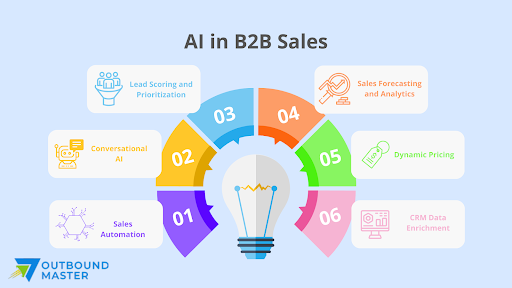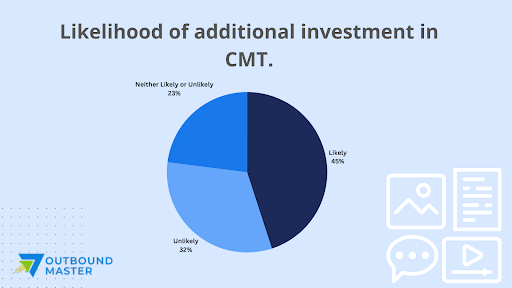10 Trends Shaping B2B Sales Management in 2024
The landscape of B2B sales management is evolving rapidly, with new technologies, strategies, and consumer expectations reshaping how sales teams operate. To thrive in 2024 and beyond, sales leaders need to stay ahead of the latest trends and understand their implications. Here spotlights the 10 most impactful trends that will define B2B sales management success in the coming year.
1. Integration of AI and Automation

The integration of AI and automation is streamlining sales processes and enhancing productivity. Sales enablement platforms, which automate various sales tasks and content management, demonstrate a 6.5% higher win rate on forecasted deals compared to those without such tools. Additionally, AI-driven sales forecasting and customer interaction tools are transforming lead generation, with 39% of B2B companies already harnessing chatbots and 33% adopting conversational selling.
As sales managers leverage automation to work smarter, the focus remains on balancing efficiency with meaningful customer connections. Though AI enhances consistency in sales interactions, the human touch is still vital for building relationships and trust.
2. Emphasis on Personalization and Customer Experience
With sales teams tapping into troves of customer data, delivering personalized interactions at scale has become imperative. The same AI algorithms that are automating sales processes now enable granular personalization. However, technology is only part of the equation. Sales managers still need to ensure that prospect experiences align with their expectations.
Slow website speeds, confusing navigation, and irrelevant messaging continue to plague many B2B organizations, with 18% of sessions impacted by slow load times. To excel in 2024, sales managers must make customer experience optimization a strategic priority.
3. The Rise of Sales Enablement Tools
Sales enablement platforms are proliferating as teams seek to work smarter. According to Salesforce, companies using sales enablement tools achieve a 49% win rate on forecasted deals, compared to 42.5% without them. By centralizing vital assets, automating workflows, and standardizing communications, these tools are driving major performance gains.
In 2024, sales managers will need to embrace next-gen enablement technology, from AI-based analytics to real-time collaboration tools. As processes get smarter and more efficient, sales professionals can focus on high-level strategy and impactful customer interactions.
4. Remote and Hybrid Sales Strategies
The remote work revolution has transformed sales techniques for good. Without reliance on in-person meetings and events, sales managers need to optimize virtual selling and engagement tactics. Strategic use of collaboration platforms, automated workflows, and engaging online experiences has become vital.
In 2024, blending remote work flexibility with targeted in-person interactions will enable sales teams to maintain cohesion and excel in a hybrid model. Managers will need to implement best practices for engagement, accountability, and results in this environment.
5. Sustainable and Ethical Selling
Consumer scrutiny of business practices is growing; 74% of B2B buyers now factor sustainability into purchase decisions. Sales managers will need to align strategies with ethical practices and sustainability principles to meet buyer expectations. Rather than a constraint, this presents an opportunity to build trust and loyalty with shared values.
Transparency, accountability, and commitment to environmental/social goals will need to be baked into sales processes. Companies that ignore this trend risk losing customers to forward-thinking competitors.
6. Leveraging Social Selling and Content Marketing

Social media is now a mainstay in B2B sales, with 93% of sales representatives utilizing social networks and 75% of B2B buyers relying on social media during purchase decisions. To maximize this potential, sales managers need to take a strategic approach to social selling and content production.
Creating and distributing valuable, engaging content on relevant social platforms paves the path for sales success in 2024. Training sales teams on relationship-building through social channels is also essential.
7. Advanced Analytics and Data-Driven Decisions
With data proliferation, sales managers are optimizing strategies with advanced analytics and AI. Predictive sales intelligence provides actionable insights on customer sentiment, emerging trends, and forecasting.
Tools like Tableau, Looker, and Domo enable interactive data analysis to inform decisions. Sales managers will need to embrace these solutions to pinpoint what’s working, correct issues, and predict future performance.
8. The Impact of Global Economic Shifts
Volatility in the global economy presents fresh challenges for sales managers. Factors like inflation, supply chain issues, and political/environmental events are impacting B2B sales strategies and projections.
Agility and resilience will be key for international sales success in 2024. Managers will need to monitor global developments closely and be ready to rapidly adapt go-to-market plans as needed. Localization, strategic partnerships, and pricing/payment flexibility can help overcome hurdles.
9. Building Resilient Sales Operations
To thrive amidst economic fluctuations, sales managers will need to build resilient operations. Adopting scalable technology, diversifying product offerings, and maintaining strong customer relationships can help weather industry storms.
Empowering sales teams with skills development and mental health support will also be crucial for bouncing back from setbacks. The ability to pivot strategies without major disruptions will separate market leaders going forward.
10. The Role of Sales Training and Coaching
Continuous skills development through training and coaching will be key for B2B sales teams to win in 2024. Sales managers will need to focus on both technical proficiencies like leveraging sales tech, and soft skills like emotional intelligence and consultative selling.
Targeted training on sales enablement platforms, virtual selling tools, and leveraging data will help teams master the latest innovations. Apps like Outreach and Gong will enable reps to hone their communication abilities. AI-driven coaching tools will also emerge to provide personalized and scalable feedback.
But human skills remain equally crucial. Training on reading virtual cues, showing authentic empathy, and mirroring prospect language enables deeper B2B connections. And coaching reps on adapting conversations based on the buyer journey stage is pivotal.
With omnichannel sales now essential, extensive training on orchestrating seamless experiences across physical and digital touchpoints will be required. Investing in continuous skills development across both human and technical capabilities will allow sales teams to thrive.
Conclusion
The B2B sales landscape in 2024 will be defined by automation, personalization, and resilience. As economic and competitive pressures rise, sales managers need to embrace innovation and continually optimize strategies. Companies that effectively leverage technology while doubling down on customer relationships will seize the growth opportunities ahead.
By staying agile and forward-thinking, sales leaders can thrive amidst the trends disrupting traditional tactics. Rather than be overwhelmed by the pace of change, see this as a chance to transform your sales operations for sustainable success. The future favors the bold.
Frequently Asked Questions
How can B2B sales teams effectively integrate AI without losing the personal touch in customer interactions?
AI should augment teams with data-driven insights and efficiency improvements, while sales professionals continue building rapport through consultative discovery, 1:1 nurturing, and addressing unique needs. Adopting AI-enabled personalization can enhance interactions.
What are the key elements of a successful remote or hybrid sales strategy?
Seamless collaboration technology, automated tools optimizing distributed workflows, training on virtual selling tactics, online assets engaging prospects, and in-person events driving strategic partnerships and relationships are key. Maintaining team cohesion and trust is also critical.
How can B2B companies align their sales strategies with sustainability and ethical selling principles?
Performing environmental/social audits, setting sustainability goals, ensuring ethical and transparent practices internally, communicating values externally, and providing “green”/fair trade product options where feasible enable credible alignment. Most importantly, sincerely committing to improvement is foundational.



